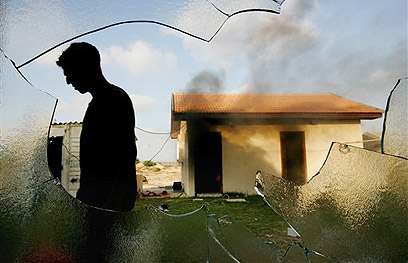Op-ed: A decade after Gaza disengagement, settler leaders have only themselves to blame; they, who applauded each and every one of Sharon’s anti-democratic tricks, knew what would happen to them.
I will remember until my very last day the expression of delight on the face of then-Central Command chief Ariel Sharon when he revealed during a routine conversation in his Be’er Sheva bureau how he had violated Chief of Staff Haim Bar-Lev’s order and met with the members of the Ministerial Committee on Settlement Affairs, who had visited the southern region that week.
He manipulated the chief of staff’s order, met with the ministerial committee members near a helicopter and convinced them to build a settlement in the Gaza Strip, in the heart of the Palestinian population.
These days, 10 years since the disengagement plan and its execution, the settlement leaders in the Gaza Strip, Judea and Samaria have only themselves to blame. They, who applauded each and every one of Sharon’s anti-democratic tricks, knew what would happen to them in advance.
Here’s a personal confession: Towards the end of the 1970s, during the settlement momentum in the territories, I said to Israel Harel, who was the leader of the right-wing Gush Emunim movement at the time: “The person who will kick you out of all the settlements, and won’t even turn around to check what happened to people, will be Ariel Sharon.” He seemed surprised. Sharon? Why he is the man who is leading the Jewish settlers to every mountain and hill and under every tree. Sharon? Yes, he of all people.

Those who followed Sharon’s devious way throughout his youth and adulthood were not surprised. I personally remember conversations with other settler leaders about him. I told them too that Sharon would be the one who would evacuate them. “I know,” a famous settler said to me. “We know Sharon and we are being careful with him. But as long as he serves our way and our needs, we will use him.”
In the settler community there were pronounced Sharonologists who followed every movement of his nose, and knew that he was mainly using the people and the ideology for his personal needs and in order to climb up the ladder of positions and ranks. They knew that Sharon had been a member of the left-wing Mapai party when it was worthwhile being a Mapainik. They also remembered the fact that before founding the Shlomtzion party in 1976, he had asked left-wing people like Amos Keinan to join him, and that only after he was defeated in the Knesset elections, winning only two seats, he went back to the Likud, which he had co-founded in 1973.
The disengagement was, therefore, part of the Mapainik nature of Sharon, who reached the place he had wanted, dreamed of and fought for – the prime minister’s bureau. And then, facing the facts, he shattered the settlers’ world, and from their greatest friend he turned into their archrival.
We may assume that it was clear to Sharon that the continued presence of 8,000-9,000 settlers among a hostile population of more than one million Palestinians was impossible. Sharon the Mapainik understood the possible outcomes of a Jewish settlement in the middle of an Arab ocean, and reached the right conclusions as far as he was concerned. Today the people who agreed with his moves are being cursed, as are of course his statements in favor of the Jewish settlement in the Land of Israel.
Looking back, it’s possible that the disengagement definitely had serious ramifications on Israel, but these are definitely not the ramifications that the Judea and Samaria settler leaders are pointing to day and night. These ramifications are mainly diplomatic, and not necessarily security-related. The settler leaders’ intention may be to engrave the lessons of the expulsion, the uprooting, the evacuation from the Gush Katif communities into the Israeli consciousness so that such an act would never repeat itself. Will they succeed?
Here’s an undeniable fact: It was Menachem Begin, the very first prime minister from the Likud, who evacuated thousands of people from their homes in the Yamit region. And no one remembers the tears, the bulldozers and the cranes destroying every good spot. It is in man’s nature to forget, and the majority of Israeli citizens forgot the difficult sights from the evacuation of Yamit and its communities when Sharon, the “woodcutter,” took on the Gush Katif communities.
As reported by Ynetnews
